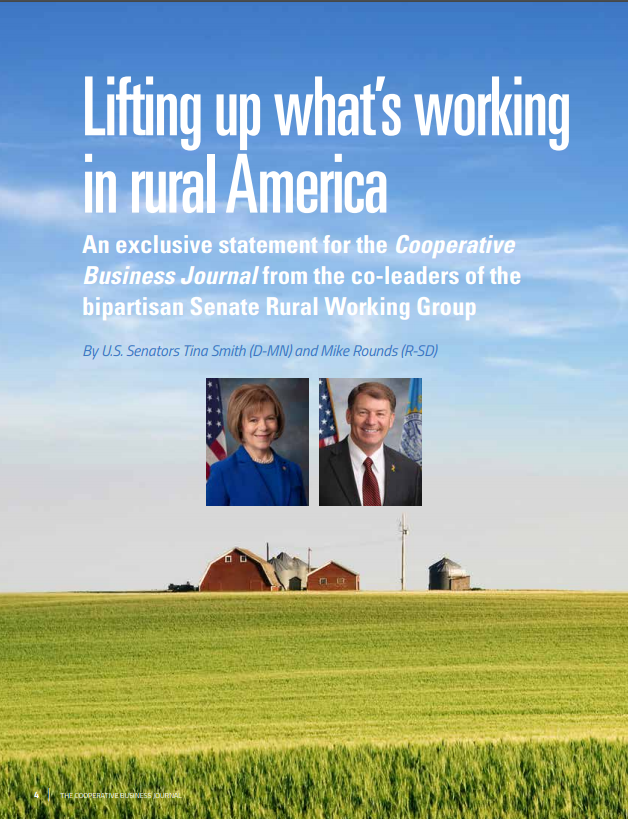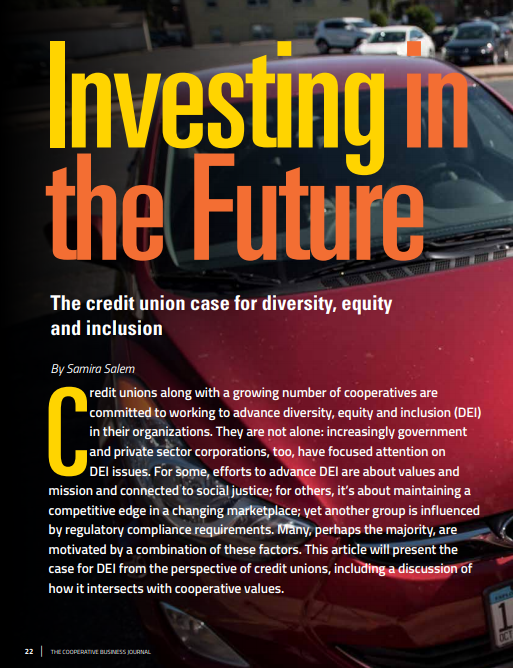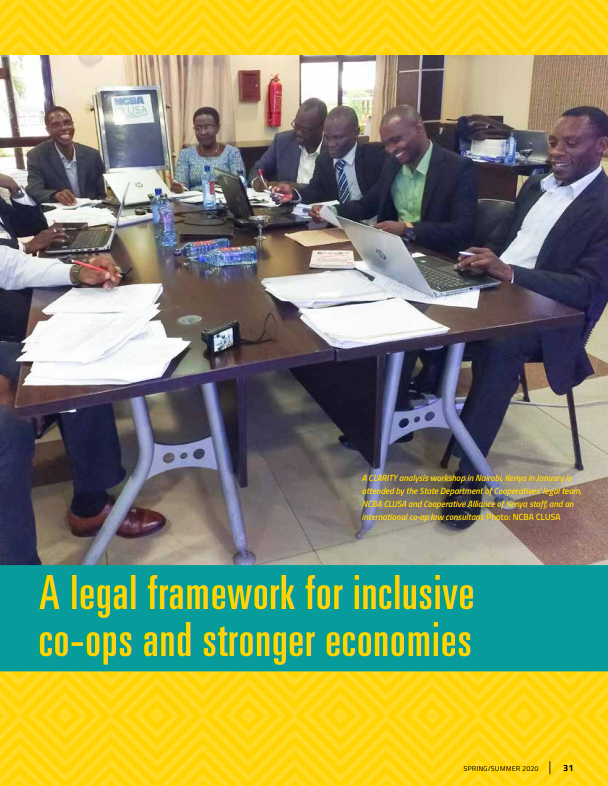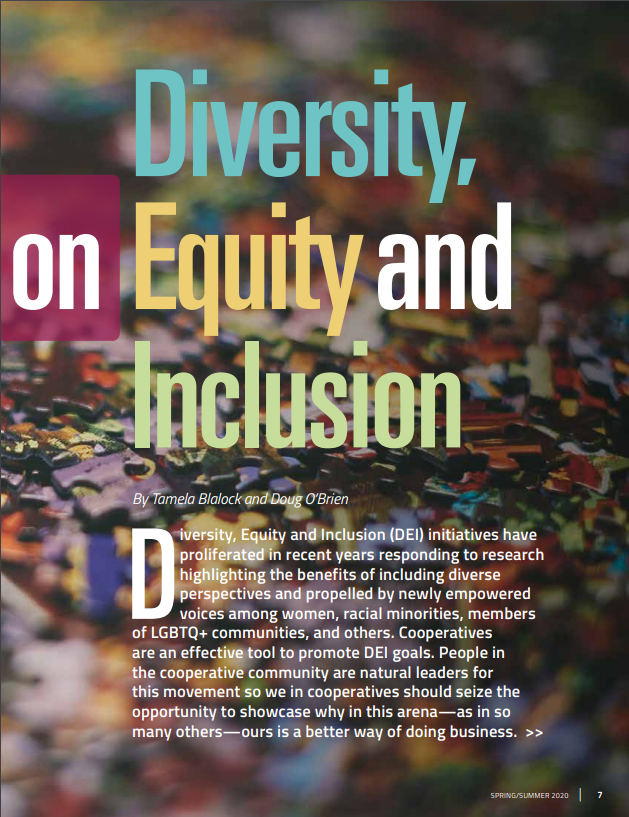 Spring/Summer 2020
Spring/Summer 2020
A Conversation On Diversity, Equity and Inclusion
By Tamela Blalock and Doug O’Brien
Diversity, Equity and Inclusion (DEI) initiatives have proliferated in recent years responding to research highlighting the benefits of including diverse perspectives and propelled by newly empowered voices among women, racial minorities, members of LGBTQ+ communities, and others. Cooperatives are an effective tool to promote DEI goals. People in the cooperative community are natural leaders for this movement so we in cooperatives should seize the opportunity to showcase why in this arena—as in so many others—ours is a better way of doing business.
Historically, people have created cooperative businesses to solve problems and gain access to the economy. Often with few alternatives, these pioneers fostered economic solidarity and provided the kind of stability that enables people to participate in society. Today cooperatives continue this important work by creating more inclusion in the economy. To continue progress in this area, we should amplify areas of success and be clear-eyed about where we have fallen short.
NCBA CLUSA is a partner and promoter of this DEI focused work. Last October, our board of directors unanimously passed a resolution on diversity, equity and inclusion to guide our work.1 This article is one of a series that will appear in the Cooperative Business Journal where we and other authors consider how co-ops operate through the lens of DEI—especially during major economic transitions. These articles will explore how the application of the cooperative identity (the cooperative shared values and principles) is key to how co-ops can genuinely promote more diverse, equitable and inclusive communities.
This work is even more important in the context of COVID-19. The crisis surrounding COVID-19 has necessarily altered the priorities of every organization. It has also exposed in stark fashion the impacts of inequality and inequity. In terms of the disparate impacts of the virus on Black/African American and Hispanic/Latinx communities, the data are startling. As Samira Salem with the Credit Union
National Association has written2:
- People of color already face significant health disparities, increasing their risks related to COVID-19;
- Significantly more people of color work in higher risk industries;
- Historic discrimination has resulted in people of color living in areas that have a higher risk of contagion.
Early data suggests that these and other factors have resulted in dramatically higher fatality rates for Black/ African American and Hispanic/Latinx people.3
Building on historic income/wealth/education/ housing/legal/healthcare disparities, the impact of COVID-19 should bring into clear focus the need to continue and deepen the work surrounding DEI— both in terms of the immediate response and the recovery. DEI work will remain important to ensuring that those most vulnerable to the fallout of crises like COVID-19 have the resources and institutional support needed to mitigate damage. The response to the crisis opens possibilities to enact changes that will enhance the resilience of our cooperatives and communities.

DEI work and the role for co-ops
We can start with what we know. For DEI initiatives to be genuinely impactful and sustained, the sources of the problems they are designed to solve must be honestly and accurately identified. The problems that DEI initiatives address are widespread and occur in urban, suburban and rural areas of the country. They exist across all states and regions. When leaders together have the fortitude to recognize that our economic, political and social systems were often designed to prefer certain groups over others—and thus yield inequitable outcomes—then we can construct DEI solutions that intentionally improve these systems to deliver equitable outcomes. The opportunity is not to adjust an existing economy; rather, it is to build genuinely inclusive economies, across the country, for the first time.
Arguing that co-ops should rightfully lead DEI work does not imply that we have accomplished everything that a commitment to diversity, equity and inclusion requires. Across the U.S., co-ops vary in how well they are achieving DEI objectives. Through this and the other articles we want readers to gain broader knowledge of the state of DEI in our movement. Doing so requires a clear-eyed examination of what has been accomplished and what still needs to be done.
Defining DEI
As a starting point, here are some short definitions of diversity, equity and inclusion.4
Diversity refers to “having a range of people across gender identities, racial backgrounds, geographic locations, socioeconomic backgrounds, ages, abilities, sexual orientation” and other like categories. Ideally, diversity is not about “checking the right boxes” but instead ensures that communities are more accurately represented, that we access broader sources of experience, talent and information, and that decision-making is more reflective of those whom it impacts.
Equity can be defined as fairness. To be meaningfully included and to accomplish their goals, different people face different barriers and need different levels of support and resources. Additionally, leadership and those in power must not abuse their positions of influence to wrongfully accrue unnecessary, extra wealth at members’ expense nor act in ways that flout rules of good governance.
Inclusion involves how we create the supportive ecosystem and infrastructure to ensure that the people who bring us diverse thinking, experiences and perspectives can participate and feel welcome. Including people means things like making sure that our meeting spaces are easily physically accessible to everyone and creating materials that are responsive to varying cultural and social contexts. When designing venues for inclusion we should ask ourselves questions such as, “Will everyone feel welcome?” “Am I placing people into a space or discussion that protects the comfort of the majority audience at the expense of the participation of others?” and finally “Have I overlooked ways I can better facilitate a space for genuinely open participation?”
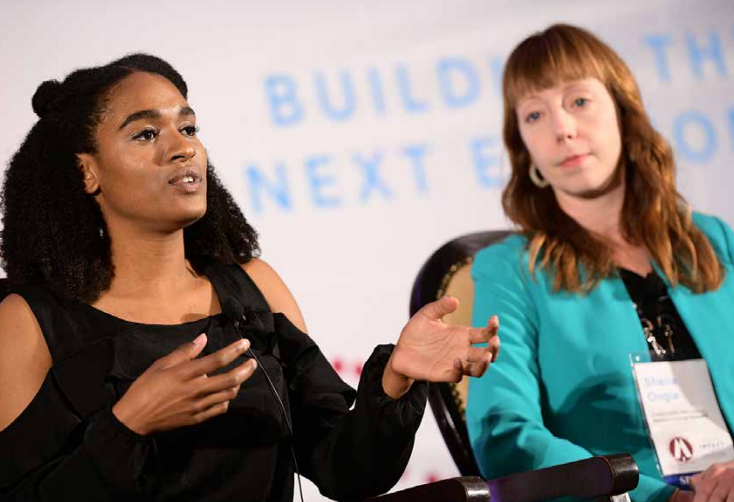
It’s clear that the case for DEI work has a rigorous ethical component. There is also a business case. Future Americans will have more diverse backgrounds and identities than today. Additionally, the U.S. Bureau of Labor Statistics projects that the workforce will become increasingly diverse over the next 40 years. The majority of U.S. workers by 2050 will be African Americans, Asian Americans, Latinx and Native Americans. Related closely, 48 percent of Generation Z (ages 8-25) identifies as non-white.5
This change is an opportunity. Market research by McKinsey finds more diverse organizations have an advantage in talent recruitment, decision making, employee satisfaction and the ability to identify and serve customer needs. Cooperatives can be at the forefront of attracting rising and existing talent and growing our market share by ensuring that we are the places where this wave of oncoming talent wants to work. To do so, co-ops will need to be aware of the needs, desires and plans of future workers and underserved demographics of loyal consumers. DEI success can become our competitive advantage, or DEI avoidance will certainly become an economic and social liability.
The 7 Cooperative Principles that serve as the foundation of our cooperative identity naturally encourage diversity, equity and inclusion. The co-op model is distinguishable from other businesses by features like democratic governance, voluntary and open membership, a commitment to sustainably serving member needs rather than seeking profitability alone, and concern for community. With these features, cooperatives are in a better position than competitors to implement the kinds of policies that DEI initiatives often require given others have competing priorities—typically the overriding goal for short-term maximization of shareholder value—that crowd out DEI goals.
This better initial position does not, however, automatically translate into DEI success. In recent years leaders from across the cooperative sectors have looked at the state of DEI in their cooperatives evaluating both successes and gaps. From these efforts, cooperative leaders and researchers have been presenting, writing articles and otherwise informing us on where their sectors stand. Perhaps the best known of these efforts was former Credit Union National Association (CUNA) board chair Maurice Smith’s February 2019 call to enshrine diversity and inclusion as an 8th Cooperative Principle. Smith urged the credit union community “to consider where diversity and inclusion for all of us stands today.” His case was grounded both in the historic mission of credit unions to expand access to financial services—such as to underserved communities—and the business realities that make DEI work an imperative for today’s credit unions. As Maurice wrote:
When we promote diversity and inclusion within our ranks, we signal our determination to outperform the competition. Diversity expands the pool of capable candidates with valuable talents. Inclusion opens the door for advancements within the organization and the movement as a whole.
At the time, Doug O’Brien lifted up Smith’s piece and showed how the cooperative identity (the shared values and principles of cooperatives) at their core already embrace the key tenets of DEI.7 What we write here is a continuation of our part of the conversation that Smith so powerfully helped launch.

Where we need to go
What should we as the cooperative business community do to improve our operations in line with ambitious and necessary DEI goals? How can we do so in an environment impacted by the coronavirus crisis? To start the conversation, here are a few suggestions.
First, we should create a culture that cultivates DEI in our cooperatives. We do this by: acknowledging our role in both where we help remove and where we create obstacles for more equitable outcomes; developing DEI strategies with the goal of creating inclusive businesses; and sharing our DEI efforts and experiences, whether that work was successful or met some challenges. By learning from both our achievements and from missed opportunities, we can develop greater inclusion of our leadership, members, employees and communities by involving them in the processes of evaluation.
Second, we need to continue fostering sectoral and cross-sectoral opportunities for such learning. The 2020 Cooperative IMPACT Conference is a premier opportunity for cross-collaboration. Because this year’s conference is fully virtual, it presents a unique opportunity to bring a wider spectrum of the cooperative community together around more accessible and affordable programming.
Third, we need to ensure that future policy enables people to use cooperatives to build more inclusive local economies. We should amplify how cooperatives serve as a tool for repairing and rebuilding our economy. In our communication, we should stress that the COVID-19 crisis accentuates both the relevance and immediate need for cooperatives.
While impossible to predict the future, we know that cooperatives will remain best positioned to serve the needs of communities as they seek a return to economic stability and community life. Whatever else happens following this crisis, we need to build more robust systems that harness cooperatives’ potential to create economic and societal resilience. Issues like broadband access and safe, affordable housing have only become more acute due to COVID-19.
One such area revolves around current U.S. Small Business Administration (SBA) disaster relief programs. NCBA CLUSA and our partners advocated for the express eligibility of cooperatives in SBA’s Economic Injury Disaster Loan (EIDL) program. Additionally, the co-op community has worked together to ensure as many cooperatives as possible are eligible for the Paycheck Protection Program (PPP). Programs like these are vital and are enabling many cooperatives to weather our current crisis.
Advocacy by cooperators for our cooperatives is vital because co-ops are their own best champions in ensuring that agencies know their needs and respond to them.
By cultivating a culture of DEI, fostering cross-sector opportunities, and advocating for policies that allow cooperatives to build more inclusive economies, the cooperative community will be able to show how our business model is the natural leader in creating more diverse and equitable businesses. Ultimately, this work is essential so that together, we can build a more inclusive economy.
Doug O’Brien is president and CEO of NCBA CLUSA, where he works with the cooperative community to deepen its impact on the economy. As Vice President of Cooperative Relations, Tamela Blalock enhances the engagement and impact of NCBA CLUSA among the broader cooperative leadership community


